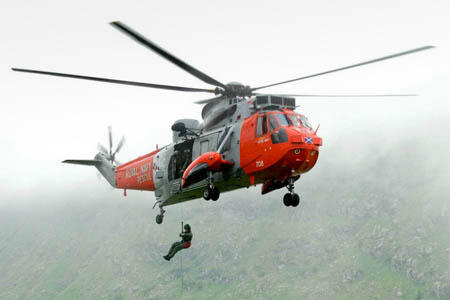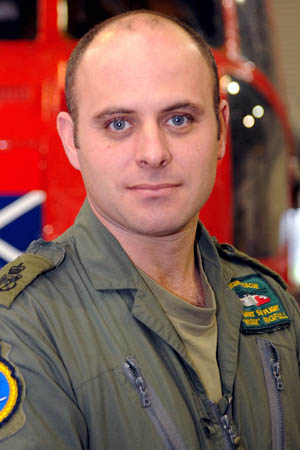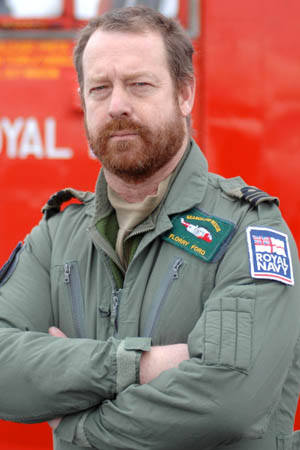Rescuers gathered this morning to celebrate a record-breaking year.
Crews from the Royal Navy’s search and rescue helicopter base at HMS Gannet have mounted an unprecedented number of missions to rescue people in distress, about half of which have been on mountains. 378 people have been rescued and crews have responded to a total of 447 callouts.
The crew members are regularly called to walkers and climbers who come to grief in the Scottish Highlands. The figures make the base, at Prestwick in Ayrshire, the busiest search and rescue operation in the UK – with 20 per cent of the total callouts of the UK’s military search and rescue aircraft – most of which are to civilian incidents.
The figures show an increase in 2009 of 65 on the previous year, during which the base’s 24 aircrew flew the fleet of three Sea King Mark IV helicopters on search and rescue missions covering 253,800 sq km (98,000 sq miles) stretching from Northern Ireland to the West of Scotland and northern England – more than 12 times the size of Wales.
The men and women flying the helicopters are supported by 79 ground crew who keep the aircraft flying and assist in running operations.
The helicopter crews respond regularly to request from mountain rescue teams for help in getting teams to remote positions, assisting with medical emergencies on mountains and winching casualties from mountains.
The unit has broken its callout record three years running and last year topped the 400 mark for the first time.
Commanding Officer, Lieutenant Commander Debdash Bhattacharya, said: “This is an extraordinary achievement. I am immensely proud of each and every individual who is a part of the close knit team at HMS Gannet.
“From the aircrew to the engineers, weather forecasters, office staff, ground crews and support staff, absolutely everyone plays their part in ensuring that there is a search and rescue helicopter ready to respond 24 hours a day to whatever the call may be.
“It’s a phenomenal sustained effort aimed at supporting the people of Scotland, Northern Ireland and northern England, who can feel a little safer in the knowledge that we are ready to help at a moment’s notice.”
Two of its crew members have also broken personal records. Petty Officer Marcus ‘Wiggy’ Wigfull has notched up 700 callouts in his 13-year search and rescue career. He is a senior aircrewman with the unit and a fully qualified paramedic. Observer Lieutenant Commander Martin ‘Florry’ Ford has amassed 600 call outs, 288 of which were with HMS Gannet in the last two years.
The grey and red Sea King helicopters are currently featuring, alongside the RAF’s yellow craft, in the Channel Five series Highland Rescue.
Petty Officer Wigfull, 38, is from Unstone in Derbyshire and now lives in Troon, Ayrshire. He joined the Royal Navy in 1989 and is married with two children. He was originally a weapon engineering mechanic before moving to the Fleet Air Arm. He was awarded the Queen’s Commendation for Bravery in the Air for his part in a 2008 rescue of three people from a yacht at Ardrossan.
Lt Cmdr Ford is 46 and was born in Havant, Hampshire. He lives near Redruth in Cornwall but is based at HMS Gannet. He joined the Royal Navy as a caterer in 1979 and moved to the Fleet Air Arm as an aircrewman in 1983, gaining a commission in 1987 and moving to search and rescue 16 years later.
He was awarded the Air Force Cross in 2005 for his part in rescues during the Boscastle floods and a Queen’s Commendation for Bravery in the Air for a rescue in a blizzard on Ben Nevis during which three climbers were rescued.
A spokesperson for the Royal Navy said: “For some of the aircrew who have returned from serving in Afghanistan, whether with the Royal Navy, the Royal Marines or on exchange with the other services, it is an ideal environment to maintain skills used in operational theatre, while for others the terrain offers an excellent training ground in advance of deployment.
“The sometimes extreme weather, harsh mountainous terrain and the skills involved in not only operating the aircraft and equipment, but also in conducting rescues and saving lives within a hostile environment, combines to make it an exceptional preparation ground for serving alongside their forces colleagues in the skies of Afghanistan.”
HMS Gannet’s crews operate to save lives on the mountains, at sea, on the roads and also supply specialist medical evacuation from Scotland’s Hebridean islands.


